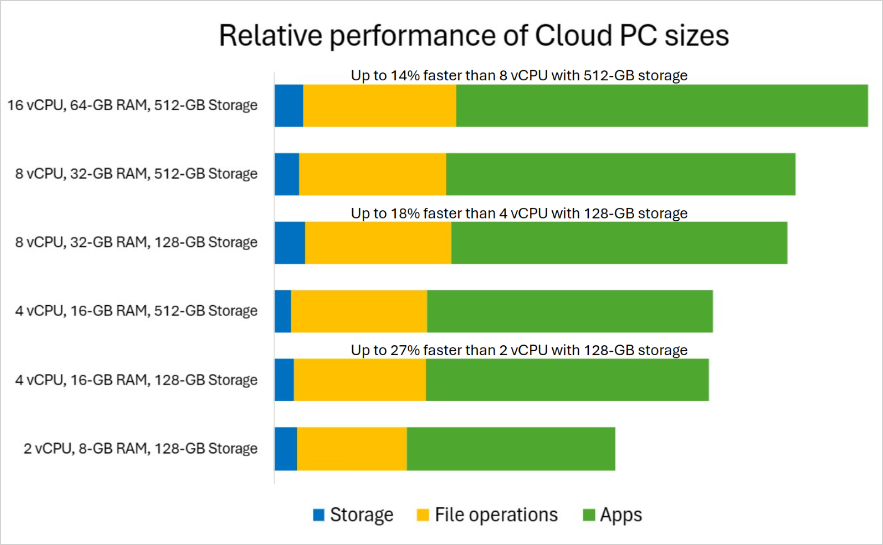Relative performance for different Cloud PC sizes
This article examines the relative performance between three common Cloud PC sizes. This information can help Windows 365 admins decide on the right Cloud PC size for their users. For the purposes of the comparisons in this article, the following Cloud PC sizes were used:
- 2 vCPU/8-GB RAM/128-GB storage
- 4 vCPU/16-GB RAM/128-GB storage
- 8 vCPU/32-GB RAM/128-GB storage
- 4 vCPU/16-GB RAM/512-GB storage
- 8 vCPU/32-GB RAM/512-GB storage
- 16 vCPU/64-GB RAM/512-GB storage
As Microsoft Cloud technology improves, the underlying virtual machines and platform that support Cloud PCs will also improve. Windows 365 development includes change management and update testing to make sure that Cloud PCs consistently support improvements in availability, performance, and the end user experience. This frees you from the need to track and adopt these changes yourselves. Instead, you can choose from a predefined set of Cloud PCs sizes for which the underlying platform is managed, tested, upgraded, and improved by Microsoft.
Test methodology
For these comparisons, industry standard tests were run to measure:
- Storage performance.
- File operations, like opening/saving documents or viewing images.
- Apps, like video conferencing or browsers.
These tests were run with identical parameters through multiple iterations with reboots between each iteration. All Cloud PC sizes were in the same production environment in the same region. The tests approximate a typical user workload running common software such as Microsoft Edge and Microsoft 365 apps.
These tests didn’t factor in various customer-specific third-party agents often deployed in customer environments. Each of these agents will have its own resource requirements that can impact performance.
These tests represent office worker workloads and don’t stress the resources, like CPU, of each Cloud PC.
It can be valuable for you to do your own testing with workloads approximating what your intended users require. Be sure to include the line-of-business applications that your employees run regularly. Use the results of your tests to determine the right choice for your users. For more information, see the Planning guide for Windows 365.
Test results

A common starting point for Windows 365 Cloud PC users is the 2 vCPU / 8-GB RAM / 128-GB storage size. The chart shows that the relative performance improvement of the 4 vCPU configuration over the 2 vCPU configuration is up to 27% faster.
For the workloads we test, the performance improvement when moving from 4 vCPU to 8 vCPU is up to 18% faster.
The 16 vCPU / 64-GB RAM / 512-GB storage size is meant to accommodate more processor intensive workloads. It's up to 14% faster than the 8 vCPU / 32-GB RAM / 512-GB storage size.
If you plan on running CPU-intensive workloads, the differences are going to be more noticeable and favor a greater number of processors. For example, workloads that require processing large datasets and have strict latency requirements during compilation work best with 16 vCPU sizes. By contrast, the 4 vCPU size is popular among Windows 365 customers with employees who only use Microsoft Teams, browsers, or Microsoft applications.
Choosing the Cloud PC size for your users
If you’d like more help in choosing a Cloud PC size for your users, check out these resources:
- The Find the right Windows 365 Cloud PC for your business online questionnaire recommends Cloud PC sizes based on a few questions.
- The Cloud PC size recommendations (Enterprise) and Windows 365 Business sizing options articles suggest workloads for various sizes.
- The Configure your Windows 365 Cloud PC page lets you choose processor, RAM, and storage parameters and then purchase. You get real-time cost and supported workloads information based on your choices.
What if I chose the wrong size for a user’s Cloud PC?
If it turns out that the Cloud PC size that you chose isn’t meeting the user’s needs:
- For Windows 365 Enterprise, you can remotely change the size. You can change the vCPU cores, RAM, and storage. For more information, see Resize a Cloud PC.
- For Windows 365 Business, you can purchase a different license of the needed size to replace the user's current license.
Next steps
To learn more about Cloud PC size options:
- For Windows 365 Enterprise, see Cloud PC size recommendations.
- For Windows 365 Business, see Windows 365 Business sizing options.
- For more information about testing Cloud PCs, see this blog post.
Feedback
Coming soon: Throughout 2024 we will be phasing out GitHub Issues as the feedback mechanism for content and replacing it with a new feedback system. For more information see: https://aka.ms/ContentUserFeedback.
Submit and view feedback for